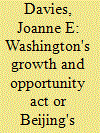| Srl | Item |
| 1 |
ID:
157880


|
|
|
|
|
| Summary/Abstract |
In development practice, how does ‘mutual benefit’ accrue, and to whom? China criticises America for perpetuating capitalist power relations and claims it can seek a new geopolitical order based on South–South cooperation. Meanwhile, there has been an extraordinary shift of emphasis towards the private sector as a driver of development, but this shift is attracting increasing criticism. The Millennium Challenge Corporation (MCC) – the only development agency to grow in influence under the Trump administration – is evaluated in the light of these two key themes. Neither China nor the private sector is successful in achieving ‘mutual benefit’ for ordinary citizens – both replicate existing power inequalities. As with the rise of both China and the private sector, the MCC also enmeshes developing countries further into the existing neoliberal capitalist structures. However, the advantages of the agency should not be dismissed outright, as its Ruling Justly and Investing in People indicators can enhance the capacity of citizens to challenge these power structures themselves.
|
|
|
|
|
|
|
|
|
|
|
|
|
|
|
|
| 2 |
ID:
106669


|
|
|
|
|
| Publication |
2011.
|
| Summary/Abstract |
Growing criticism of Chinese engagement in Africa centres on the risk to African development posed by China's aggressive export policies and the threat to the Washington Consensus and African governance posed by China's 'non-interference' approach to engagement. This article challenges both these assumptions. The growth of Chinese trade has a wide range of impacts, depending on the sector in question, and the current terms of trade Washington extends to Africa under the auspices of the agoa do not result in uniformly beneficial effects. With regard to African governance, it is argued that the 'Washington Consensus' has been based on competing and often muddled perceptions of US national interest. This fact tempers the regret felt at Washington's loss of influence over the good governance agenda. Evidence is provided to show that China can work within properly regulated countries and industries, if the African governments in question can provide fair, efficient and transparent environments in which to operate.
|
|
|
|
|
|
|
|
|
|
|
|
|
|
|
|